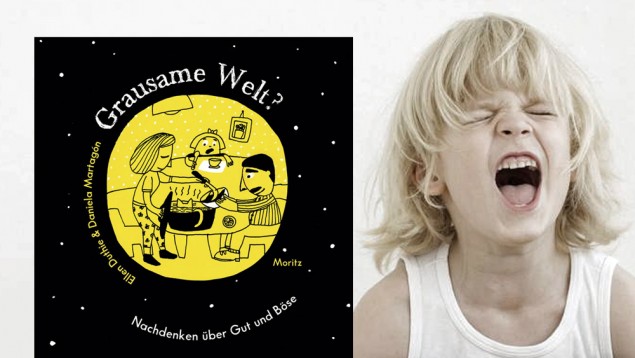Cruelty declared apt for children
Ellen Duthie
Yesterday this fantastic review by Kim Kindermann of the German edition of Cruelty Bites published this month by Moritz Verlag (Grausame Welt?) was aired on German public radio Deutschlandfunk Kultur.
Here is a translation of the review. Long live Grausame Welt?!
Far from your typical read-aloud book for children: Cruelty Bites, by Ellen Duthie and Daniela Martagón, approaches the subject in a playful way. (Moritz Verlag / imago / Westend61)
Deutschlandfunk Kultur
LESART. 26.02.2019
Kim Kindermann
Cruel situations and scenes, described and illustrated by two authors: Cruelty Bites invites children to think about good and evil. A very successful book about a very difficult subject, in our reviewer’s opinion.
"Let’s try pinching very hard. Any reaction?” says the card, showing a boy tied down to a table. The scientists experimenting on the child are rats. On another card, a man has been locked up in a cellar by a group of children. "Now you stay down here and think very carefully about what you’ve just done!" they say. And on another card, a girl is biting her own arm.
Three scenes, three cards. Three of a total of 20. All of them are square. On one side, we see a cruel situation: a girl kills an ant, some lions eat a goat, a mother and father serve a stew made with cat meat, some children pull a girl’s hair, a father holds down his son firmly to give him a shower. On the back of each card, lots of questions on the theme.
Off with the rose-tinted glasses!
Philosopher Ellen Duthie doesn’t actually offer any answers as to what cruelty is. She asks where cruelty starts, what about the victims, what about the perpretrators, and whether an act might be less serious if it doesn’t last too long.
Step by step we are invited to analyse the situation. The focus is always on the questions. What do you find cruel about it? Have you ever experienced a similar situation?
It is demanding. Ellen Duthie does not only ask children to deal with this difficult problem; she also tells them cruelty exists. So off with the rose-tinted glasses"! The world isn’t all pretty.
But should we ask children questions? Yes, we should! Because children live in this world, with all its shadows too; children see and also experience situations that are not easy. The sooner they learn to classify situations, to give them a name and understand their own feelings, the sooner they might try to avoid being cruel. Here, that happens because they are allowed to experience different situations playfully.
Dialogue and reasoning about violence
But also because these cards invite readers to comment. Unlike your typical read-aloud book for children, here exchange and reasoning occurs. That is good. The format also contributes to this.
The cards allow several children at the same time to engage in dialogue about different aspects of cruelty and to reason with each other. Duthie manages to make you want to speak about a subject that many would rather avoid altogether.
Daniela Martagón’s illustrations are also a great success in this regard. On the one hand, they are simple, in black and white on a colour background, and reminiscent of cartoons. On the other hand, they play with the absurd as a mechanism of distance. Like the rats, that keep the children in cages as test subjects. Or the girl who bites herself, and whose enormous sharp teeth seem to belong more in the mouth of the cat that is standing opposite her, with its hair standing on end.
Illustrations that don’t miss a beat
There’s nothing pretty or cute about the illustrations, which clearly hone in on the cruelty of the content. This is stressed further by the bright background colours: pink, orange, blue, green and yellow. They act like a flag: Attention! This is important!
And yes, this book of cards is important. Let’s state it clearly: children ought to be taken seriously. We can and should speak about subjects such as cruelty with them, philosophise with them.
What is more, we can start early on, with no rush: Cruelty Bites is perfect for preschoolers and primary age children. What is ok and what is not? Where are the limits and to what extent can they shift? It is never to early to start talking about all of this.
Ellen Duthie, Daniela Martagón: Cruelty Bites / Mundo cruel
German edition translated from the Spanish by Paula Peretti
Moritz Verlag, Frankfurt / Main 2019
